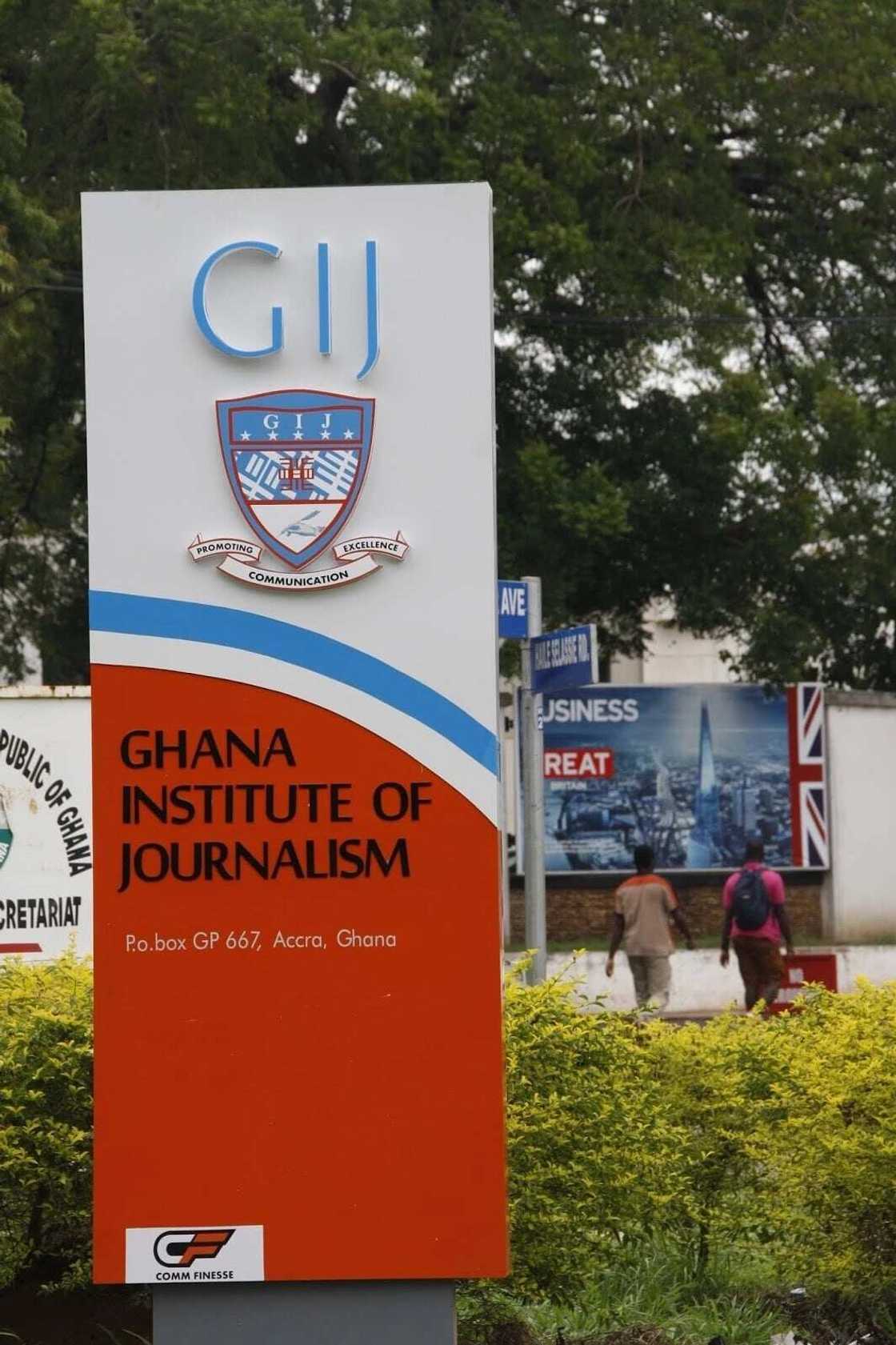Ghana Institute of Journalism cut off points and admission requirements
Studying at the prestigious Ghana Institute of Journalism provides an individual with immense opportunities. The school consists of speakers and lecturers, as well as students who are already pursuing their careers in media and communication. As a result, students at this institution have invaluable opportunities to learn from practitioners and peers.

Established in October 1959, it is one of the journalism schools in Ghana offering a unique method of teaching with a difference. It was incepted during the Kwame Nkrumah time of rule to provide training in journalism. The school is focused towards remaining a highly academic professional communication institution, serving the needs of the society, industry, and students.
The following core values drive it:
- Excellent teaching and learning environment
- Teamwork
- Accountability with integrity
- Linking theory and practice
- Commitment to excellence
Academic courses offered at Institute of Journalism Ghana
GIJ is the leading private media schools in Ghana providing students with high-quality knowledge in journalism. Some of the various courses you can undertake from the institution include:
1. Diploma in communication studies
It is a well-detailed program that consists of social sciences, communication, and arts subjects. All of these areas of research enable students to grow their potential in any of the specialized areas of communication. Upon graduating, one can further their studies as professionals in different areas such as marketing, advertising, public relations, newspaper/magazine, wire service, online journalism, radio, and TV.
2. Bachelor of Arts in communication studies
It is a degree program that provides students with media-oriented courses combined with arts education and social sciences. It was designed to help the student develop skills in practical and theoretical communication studies.
It is a well-designed course to offer undergraduates a professional career path in public relations or journalism.
3. Masters of Arts in journalism
This is a one-year Master of Arts degree program with a focus to train individuals from various backgrounds. It also instills knowledge in students on how to utilize and apply the concepts of journalism with the media and communication.
4. Masters of Arts in public relations
It is also a one-year program that aids in developing the workforce of potential journalists, to utilize public relations strategies at their place of work.
5. Masters of Arts in development communication
The need to introduce this vital field of study in communication was to fill a professional and intellectual gap. It will also play a critical role in accelerating the development of the Millennium Development Goals (MDG)
Applications for candidates who would wish to pursue different course for this academic year are being invited. The application forms for Ghana Institute of Journalism are available from the school, or their website.
The courses that have been advertised include:
- Diploma in communication studies for regular and weekend students
- Faculty of public relations and advertising B.A. in communication studies, public relations option
- Faculty of journalism B.A. in communication studies, journalism option
The minimum entry requirements for each course as indicated below:
Bachelor of Arts in communication studies
- WASSCE holders: applicants must possess passes (A1-C6) in six subjects comprising three core subjects including Mathematics, English and three elective subjects with an overall aggregate of 36 or better.
- SSSCE holders: candidate must have passes (A-D) in six subjects comprising three core subjects including Mathematics and English. They should also have an aggregate of 24 in three elective subjects. These are the grades required for Ghana Institute of Journalism
Diploma in communication studies (regular and weekend sessions)
For the weekend session, the lectures will commence from Friday until Sundays. This is for the students who will have attained the qualifications to Ghana Institute of Journalism
- WASSCE holders: a candidate must have passes (A1-A6) in five subjects comprising three core subjects including Mathematics and English. They should have an overall aggregate of 30 or better in to elective subjects.
- SSSCE holders: Applicants must have passes (A-D) in five subjects comprising of three core subjects including Mathematics and English. They should also have an aggregate of 20 or better in two elective subjects.
Mature students
Candidates interested in undertaking courses in Ghana Institute of Journalism as mature students should not be less than 25 years of age, as of the time of application. They should also satisfy the following minimum requirements:
- One should have an (A-D in SSSCE and A1-C6 in WASSCE) in five subjects consisting of the core subjects including English language and Mathematics. Having passed two elective subjects is also mandatory.
Applicants whose qualification will not meet the minimum expected requirements , may be considered for admission, after sitting for a special entry exam an passing it. Candidates who are waiting for their results are also eligible to apply. Candidates should note that the selection process is based on the competitive cut off points for the year.
Are the forms of Ghana Institute of Journalism out? Yes, they are and so many candidates have already started applying to join the institution. The level 300 top-up for the weekend classes are expected to meet the following minimum requirements which are the Ghana Institute of Journalism cut off points.
- Final year diploma students are eligible to apply as applicants who are still waiting for their results. Certificates should however be provided for a successful completion of the application process.
- Degree holders with a minimum of second class lower division in psychology, sociology, Information Technology, information studies, social studies, political science, marketing, French, and English are eligible to apply.
- Higher national diploma holders with a minimum of second class lower in social science and humanities, management studies, secretary, Information Technology, and marketing can also apply.
- Diploma holders with final grade point average of 3.25 from the following disciplines education and management studies, social administration, public administration, and archival studies are eligible to apply.
- Ghana Institute of Journalism diploma holders with a minimum final grade point average 2.50 grade B. Having an equivalent diploma from an accredited communication training institution also makes one eligible to apply.
International students
International students who hold equivalent qualifications are also eligible to apply. The cost for the application forms is as indicated below:
- International applicants-$100.00
- Diploma-GHc 200.00
- Degree-GHc 200.00
There are two types of applications if you would like to apply.
1. You can complete an online application
2. Download the application forms
Short courses offered at Ghana Institute of Journalism

The institute also provides short courses for the general public and practitioners in communication-related areas. These courses include:
- Effective public speaking, speech writing, and presentation
- Writing for newspapers and magazines
- Customer care, events management, contemporary English language
- Photo journalism, writing skills, TV journalism, online journalism, radio journalism
- Action and strategic planning, broadcast journalism, advance marketing, advanced communications, advanced public relations, advanced advertising.
- Public relations, advertising, and marketing
- Radio and television presentation
Is Ghana Institute of Journalism a government school?
The Ghana Institute of Journalism was established in 1958during the reign of Kwame Nkrumah. The former president had a vision to train patriotic journalists who would play a role in emancipating the African continent. Formerly it was known as the Ghana School of Journalism.
In 1974, a decree was formed hence the formation of the new name, the Ghana Institute of Journalism. The objectives of the institute were:
- To organize practical training, researches, experiments, demonstrations, seminars, lectures, and classes. In turn, it would fast track the training of journalism and mass communication.
- Impact young women and men with knowledge in techniques and skills regarding public relations, advertising, mass communication, and journalism.
For several decades, these were the objectives that helped the Institute’s method of awarding certificates and diplomas, in communication studies. Formerly, these were the requirements for Ghana Institute of Journalism.
The Ghana Institute of Journalism, has set itself apart top provide its students with quality education that would prepare them for the job market. This is achieved through using a holistic approach that is compared to no other.
Source: YEN.com.gh







